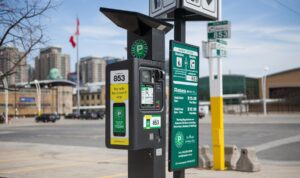
Members of the Turtle Protectors held a noisy parade through High Park on May 24 to bring awareness of saving the turtles which are endangered species. Courtesy photo.

The Mimico GO Station lacks access for those with challenges and is rated as one of the most ignored stops in the network.
Politicians and community leaders say the Mimico GO Station is the most neglected in Toronto and it has been almost 10-years since Metrolinx promised residents to make the facility more accessible.
Members of the Mimico Residents Association (MRA) said seniors or others with mobility challenges face major issues in accessing parts of the station or trains if they are using wheelchairs, cane or moms pushing a baby stroller.
The group said another Canada National AccessAbility Week, which runs from May 25 to 31, has almost gone by and many people still cannot access the GO train.

Members of the Mimico Residents Association say the steep stairs cannot be accessed by those with mobility issues, wheelchairs, strollers or moms with baby strollers.
The MRA is holding a rally on May 27 outside the Mimico station to demand an accessible Mimico GO Station. Signatures are also being collected for a petition to be presented in the Ontario legislature by newly-elected Liberal MPP Lee Fairclough.
Fairclough sent a letter to the Minister of Transportation Prabmeet Sarkaria on March 25, documenting the unkept promise to make the station accessible by 2023 and asking the Minister to prioritize construction and share Metrolinx’s design and construction timelines.
The MRA said the Mimico Station is one of a few stations still lacking accessibility features ‘which is an unacceptable reality that contradicts the requirements of the Accessibility for Ontarians with Disabilities Act (AODA).
“Generations of volunteer MRA directors have been fighting the unprecedented neglect our station has faced,” the MRA wrote in a letter to Metrolinx.
They said the lack of accessibility at the station creates ‘significant barriers for people with mobility constraints, seniors, caregivers and strollers and others who rely on accessible transit.’

The MRA has been trying for more than 10 years for the Mimico GO Station to be fully accessible and there is no idea when that will occur.
The association is seeking for the formation of a liaison committee including residents, stakeholders and Metrolinx officials to talk about the long-awaited updates and work progress.
The have letters dating back to 2016 when the community was first promised the updates by Metrolinx.
“Community frustrations and concerns grow,” wrote president Rozhen Asrani. “We ask that Metrolinx begin regular engagement sessions immediately to rebuild public trust and ensure accountability.”
More than 12,000 people have signed a petition calling on the City to halt a plan to demolish the beloved Cineplex Cinemas Queensway to build 10 huge condo towers.
The online petition states the movie complex has been an entertainment cornerstone for the South Etobicoke community and there is no guarantee it would be saved.
The matter will be decided by Etobicoke York Community council on June 4 and then considered by City Council at their meeting on June 25, 26 and 27.
A City report recommends approval of an application to amend the Zoning By-law to permit a mixed-use development consisting of 10 buildings ranging in height from 18 to 46 storeys and two 7-storey non-residential buildings .
The proposal includes 4,077 dwelling units, including affordable housing units; a minimum of 2,893 square metres of non-residential floor area, with the two seven storey buildings proposed for employment uses.
The complex will have three new public streets and parking for about 2,000 vehicles.
The developer has agreed to provide as a community benefit a 900-square feet daycare facility and a 4,350 square feet park, which will be turned over to the City.
“It is yet mostly another concrete jungle,” explained the petition. “There is no support for infrastructure to accommodate additional density such as transportation, schools and health options.”
The report said the massive construction work will be conducted in three phases to keep the theatre open for movie lovers.
“The phasing takes into consideration the desire to maintain the Cineplex on the site for as long as possible,” according to City staff. “To support the continued operation of the Cineplex, a minimum amount of surface parking spaces will be maintained.”
There has been a lot of feedback from angry area residents about the multi-year development.
One woman wrote on social media that she has been taking her family to the Cineplex for three generations and ‘it saddens me to lose this movie theatre that has so many great memories.’

Residents are concerned that more than 4,000 housing units are planned without upgrades to transit or infrastructure.
“It’s part of the glue that holds this amazing community together,” another person wrote. “Condos can be built anywhere, but the kind of memories and experiences that this Cineplex provide, can only happen here.”
Many of the residents complained of the density and the site may struggle to handle such an influx of residents with infrastructure limitations and no increased transit capacity on the horizon.
The north end of the complex, previously home to low rise businesses fronting The Queensway, is already in the process of being developed with new mid-rise residential buildings.
Residents and New Toronto business owners are crying foul over the possible loss of a third Green P parking lot to the City for use to build needed housing.
City officials have deemed the Green P parking lots at 120 Sixth Street, known as Carpark 511, and 140 Fifth Street or Carpark 506, as surplus and turned them over to Toronto Builds, a City corporation that develops underutilized real estate assets to unlock their value.
A third lot at 66 Third Street is slated for use as a 50 bed shelter for homeless seniors, rather than initially an 80-bed shelter for homeless men.
A 51-unit modular housing project is planned for the lot on Sixth Street to provide housing for marginalized groups who use community services.
Officials of the Lakeshore Village Business Improvement Association (BIA) have written to City Council objecting to the potential loss of the lots, which can hold about 150 vehicles in total.
BIA Vice-Chair Chris Korwin-Kuczynski said “losing two more (parking lots) will be devastating to these main street businesses.”
He said businesses are not able to expand or add more capacity as they will not receive necessary permits or licences from City officials due to a lack of parking in the community.
“Their future licenses are at risk should they not qualify based on parking availability which will result in huge financial losses,” according to the BIA.
Korwin-Kuczynski said an ongoing Lakeshore Avenue Study is recommending an increase in building heights and higher neighbourhood density for the Lakeshore area, with heights of nine-stories proposed.

There will be less of these parking meters as two New Toronto parking lots have been declared surplus for housing.
“Without mandated parking for residential units, this will strain existing paid parking, creating a conflict between business customers and residential parking,” the BIA said.
Mayor Olivia Chow has said that housing is a top priority for City officials.
“The people of Toronto need us to leave no stone unturned when it comes to building desperately needed affordable housing,” Chow said recently.
Meanwhile, some City Councillors are calling for public consultations on the use of surplus lands; including those planned for use as shelters.
The City has about 38,000 surface parking spaces that can be considered for much-needed housing. Twenty-three lots are garages that account for about 10,500 spaces. The remaining 27,500 spaces are contained in about 181 parking surface lots.

Selected seniors with medical issues will be provided a free air conditioner by the City to fight the heat. CBC photo.
There will be air conditioning relief provided to some seniors to cope with the heat this summer.
City officials have launched a program to provide air conditioning units to some 500 low-income seniors with medical needs this summer in a pilot project hastened by climate change.
The item was adopted by an Infrastructure and Environment Committee and considered by City council during their May meeting.
The plan calls for indoor portable air conditioners be provided to chosen seniors with medical needs living in multi-unit apartments before the temperatures reaches 26C, according to proposed guidelines.
Some 500 air conditioning units will be distributed to qualified seniors starting this month, according to City documents.

Overheated senior sweating in high temperature at home cooling in front of a fan during the hot summer weather. Courtesy photos.
Those aged over 65 with medical issues can apply through their guardians by phone or online and is proposed to be selected in draws, similar to a lottery. The devices will be delivered to their homes.
“Toronto is increasingly experiencing the effects of climate change, including more frequent, prolonged and extreme heat events,” according to a committee report. “
“Excessive indoor temperatures are a significant concern for many, including residents in multi-unit residential buildings without air conditioning.”
The heat can lead to ‘a significant impact on seniors and individuals with health conditions (e.g. chronic heat and lung conditions, asthma, cancer).’
“This initiative is a Mayoral priority that received funding in Budget 2025, aligns with broader climate change resilience efforts and complements existing supports, such as the City’s Hardship Fund,” according to the report.
The City currently provides financial assistance of $300 per household for air conditioner purchases to Social Assistance clients and income-qualified individuals through the Hardship Fund. In 2024, the City issued approximately 650 subsidies.
Demand for the pilot program is expected to exceed the available funding of $200,000, according to City staff.

ECI coaches (Far Left: Andrea Bernal, Vlad Ilic) and (Far Right: Sarah Jackson and Brent Jackson) and players showcase their medals after winning the Ultimate Frisbee national title in Ajax. Photos courtesy of Etobicoke Collegiate Institute.
By CRAIG CHRISTIE
Etobicoke Collegiate Institute (ECI) has had a very successful athletic year.
In the fall the golf team won the city championships, their second in the past three seasons, with the boys team advancing to the provincial championships in Timmins and the girls competing in Windsor.
This past spring, the Cheerleading team captured the school’s first provincial championship, beating 15 other schools for the title. Now, the senior Ultimate Frisbee team can call themselves national champions after winning gold at the Ultimate Canada High School Invitational (UCHSI) in Ajax over the May 3-4 weekend.
“This is a culmination of all the hard work the students put in,” said Brent Jackson, community coach of the ECI team. “The early morning practices where everyone came out, rain or shine, worked hard and put in the effort to get better. I couldn’t be prouder of the team.”
After finishing second at the 2024 championships the team had one goal in mind for 2025: to win it all. Over the course of the weekend, they played six intense games highlighted by incredible defense, athletic catches and precise throws. With so many students who play other sports such as hockey, football, volleyball, or track and field it was ECI’s team athleticism that carried them to victory throughout the tournament.

Brennan Vecchio, MVP of the tournament, and Medina Icagic hoist the national championship trophy after ECI’s win at the Ultimate Canada High School Invitational.
The entire team was locked in and focused from the first point of the first game, right through until they were crowned champions. It was truly a team victory, however, with all team sports, there were some standout performances from players such as Marcus Colebrook and Medina Icagic. One player stood out from the rest, as ECI’s Brennan Vecchio was named the tournament’s Most Valuable Player for his overall play on both sides of the disc. “Brennan is so deserving of this award,” claimed coach Sarah Jackson. “He’s an excellent player and athlete, with tremendous leadership abilities.”
After winning their first three preliminary round matches, the team advanced to the quarter-finals where they took on Adam Scott Collegiate and Vocational Institute from Peterborough. The Rams dominated play to defeat the Lions 13-2. In the semi-final match they faced a perennial provincial powerhouse, the Bowmanville High School Talons. This was a tight, back and forth affair with Etobicoke taking a 6-4 lead into half-time. However, the team stepped it up in the second half with their defence and won decisively 13-5. This set up the rematch from the 2024 championship between the top-seeded Kelvin High School from Winnipeg and the second seeded Rams.
“Kelvin has a solid, longstanding program with a great mix of athletes and club frisbee players, so we really had to be on our game in the final,” stated coach Brent Jackson.
It was a low-scoring affair with Etobicoke leading 6-3 at the half but the team again came out after the break and shut down the Manitoba rival, holding Kelvin scoreless and cruising to an 11-3 victory. “We knew we could score but our defense was outstanding throughout the weekend and we converted forced turnovers into quick points.”
ECI’s Ultimate Frisbee trophy case is filling up; the girls team won the TDSB City Championships in the fall and the varsity co-ed team won the City Championships in May. However, the national championship win stands above the rest. However, their work isn’t done. The team is headed to the provincial championships in Barrie to hopefully close out a storybook year on the field.
The Toronto Spring Bird Festival is a celebration of birds that takes place annually in May and June to mark the return of millions of migratory birds to our city.
There are number of activities being held in South Etobicoke to welcome back our winged friends.
At this time there are many bird watchers capturing shots of our feathered friends in our lakefront parks and streams.
Colonel Samuel Smith Park will be staging two family-friendly events to welcome the birds at festival grounds at the end of Colonel Samuel Smith Park Road.
Whimbrel Point is also a popular spot in the park, where for three to five days a year, the birds use this area as a resting point on their migration to their breeding grounds in the Arctic.
There will be a celebration on May 24 from 10 a.m. to 2 p.m., which will include seven guided walks. The festival will have live birds and reptile exhibits, workshops, and educational displays for the young ones.
Family walks are also planned for June 14 from 9 a.m. to 11 a.m. at Sam Smith with leader . Those interested are asked to meet in the south parking lot at 9 a.m.
Zarankin is a Toronto lecturer and birder whose first book, Field Notes from an Unintentional Birder, was a Canadian bestseller. She has written dozens of articles on birding.
Some of the best area parks for bird watching are those along the Humber River and Lake Ontario waterfront, and includes King’s Mill Park, Humber Bay Park West, Humber Bay Shores Park, Colonel Samuel Smith Park, Marie Curtis and Tommy Thompson Parks.
Tommy Thompson is home of a noted Bird Research Station and is designated an Important Bird Area with over 300 species recorded to date. Bird cries can be heard along the trails and gulls; finches and night-herons are some of the usual residents.
Most of the walks are organized by Citizens Concerned About the Future of the Etobicoke Waterfront (CCFEW), which organizes monthly bird walks September through June at Toronto waterfront parks, including the ones at the Bird Festival.
Colonel Sam Smith Park is the primary location for Spring and Fall walks and Humber Bay Park is the usual location for winter walks. The weekend walks are led by experienced birders and are free for anyone who is interested in attending.
For more contact info@ccfew.org

Area woman is fighting for her life after being hit by a pick up truck at the intersection of Kipling and Horner Avenues.
A woman is fighting for her life after being hit by a pick-up truck at Kipling and Horner Avenues in the second life-threatening incident at that intersection in a month.
Police said a 63-year-old woman was walking across a crosswalk at the busy intersection on May 17 around 5 p.m. when she was struck.
Toronto Police Traffic Services in a release said a 48-year-old man was driving a black Dodge Ram truck westbound on Horner Avenue when the incident occurred.
“The driver made a left turn and hit the woman,” police alleged. “The woman was taken to hospital with life-threatening injuries.”
The driver remained on the scene and charges may be pending as the investigation continues.
On April 14 a man was on his way home from work and waiting at a bus stop at the intersection when he was hit by a vehicle that was involved in a personal injury collision around 5:20 a.m.
Police alleged a 21-year-old man was operating a Jeep Cherokee northbound on Kipling Avenue and apparently ran a red light and struck a vehicle travelling westbound on Horner that was making a left turn on Kipling.
“As a result of the collision, the Jeep continued off the roadway and struck the male pedestrian,” according to police.
A 42-year-old man was ‘rushed to a local trauma centre in life-threatening condition.’
Police are asking residents, businesses, and drivers, who may have security or dash camera footage of the area or incident, to contact police at 416-808-1900, Crime Stoppers anonymously at 416-222-TIPS (8477), or at 222tips.com

Long Branch resident Chris Morren is among avid Toronto Maple Leafs fans who have taken to the streets to support their hometown team.
Maple Leafs fans were out supporting and cheering their hometown team all over the community.
Avid Leafs fan Chris Morren, President of Great Outdoor Advertising, was seen at the Long Branch GO Station area on May 17 cheering his boyhood team.
Morren even has a dog which he dresses in a Leafs sweater.
“I love the team and I would like to see them go all the way,” he said. “I and the whole city would like to see them win the Stanley Cup.”
The big game between the Maple Leafs and Tampa Bay takes place on March 18.
The last time the Toronto Maple Leafs won the Stanley Cup was in 1966-1967 season, way before the Internet, cell phones and Uber eats.

A magic mushroom store in this strip on The Queensway and Islington Ave. was shot up by a rival gang in mushroom feud. Staff photo.
Two South Etobicoke magic mushroom shops are among about a dozen dispensaries targeted by gunmen in an ongoing feud by rival gangs.
Toronto Police are probing a slew of shootings targeting magic mushroom shops in addition to an ongoing rash of tow truck shootings, beatings and arsons.
Police said there have been more than eight cases in which gunfire were fired at magic mushroom dispensaries across the City. The eight shootings took place over three nights.
One store at The Queensway and Islington Avenue area was hit by bullets around 10:45 p.m. on May 15, according to police. Multiple bullets were found outside he shop.

Another downtown area mushroom selling store was subject to gunfire in eight incidents in three days. Photo: The Toronto Star.
And just blocks away another mushroom selling store had a vehicle driven through a front window. No one was in the car at the time.
The incidents have left area businesses and employees fearing the worst.
The most recent shooting occurred in Little Italy area on May 16.
Numerous bullets were found outside a dispensary at College Street and Dovercourt Road around 4:30 a.m. after the shots awoke residents and police called.
Inspector Jeff Bangild, of 22 Division, said there has been no injuries and the investigation is a high priority for police.
“We have a number officers working on that case,” he said. “It is very concerning.”
Police said their Centralized Shooting Response Teams from the Integrated Gun and Gang Task Force are investigating the incidents.
Magic mushrooms remain illegal in Ontario and across Canada. Despite the prohibition, unlicensed dispensaries have surfaced in Toronto and other areas that are openly selling psilocybin products without federal authorization.
York Regional Police officers last month cracked down on the illegal sale of magic mushroom products, seizing more than $3.5 million worth of illicit substances, including the psychedelic drug DMT, and charging 15 people.
People in the mushroom selling trade said one group is undercutting another for sales and an underground campaign is underway to scare customers away from certain stores that are selling illegal mushrooms at lower prices.